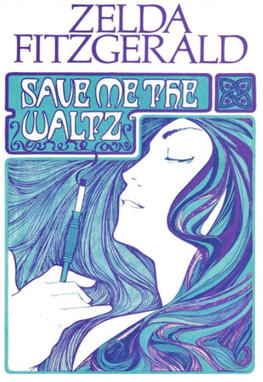
Author: Zelda Fitzgerald
#Pages: 225
Genre: General Fiction
Date Published: 1932; Republished 2001
Rating: 4.5 out of 5 Stars
Recommended?: Yes
Earnest Hemingway, F. Scott Fitzgerald, T.S. Elliot—these are the authors that occur in one’s mind when thinking of the “Lost Generation”. They were men, writers, disillusioned with a world destroyed by war. Yet, there was more to this time period and the literature produced during it. There were women; there was Gertrude Stein and Hadley Hemingway. There was Zelda Fitzgerald.
In her only novel, Save Me the Waltz, Zelda Fitzgerald describes the familiar dissolution of the American dream felt by many of the authors of 1920s. However, unlike other writers of the period, she describes these themes through a woman’s perspective. Save Me the Waltz is the semi-autobiographical account of a young woman from the South, Alabama Beggs, specifically detailing her marriage and her life with the artist David Knight. At first, she is enthralled with the late-night parties and the ritz and glamour that come along with her marriage to David. However, she soon sees the emptiness of such a life and turns away from her husband and into herself. In Paris, she recognizes her dream to become a great ballerina and begins to take lessons in a nearby dance studio. After months of practice and weeks of neglecting both her family and her customary lifestyle, she becomes exceptionally close to fulfilling her dream. She moves to Italy and performs in a ballet. However, soon after, her dream is shattered by an infection, which leaves her incapable of dancing again. Upon recovery, she returns to America with her husband and daughter to attend her father’s funeral. The novel ends with her and her husband resigned to complacency, seemingly content in mutual disillusionment.
For anyone who is interested in the Lost Generation, Save Me the Waltz is a necessary addition to his or her library. It brings full circle the thoughts and attitudes of many of the writers of that time – illuminating a woman’s perspective from an era that is described largely and almost singularly by men. With events taken from her personal life, the novel gives a different point of view on the workings of Zelda and F. Scott’s relationship, a marriage that has long incited the interest of readers. Drawing on many of the same themes as Fitzgerald’s Tender is the Night and written at relatively the same time, Save Me the Waltz parallels many of the plot points of what has become, arguably, Fitzgerald’s most famous work. Consequently, Save Me the Waltz is an interesting juxtaposition to that novel and good companion for those reading it. Zelda Fitzgerald’s writing style, with a devoted attention to minute details, makes Save Me the Waltz a thoroughly engrossing read and one that can very successfully stand on its own as a great and unjustifiably overlooked piece of literature.
Review by Christine Degenaars, CSOM '15

 RSS Feed
RSS Feed
